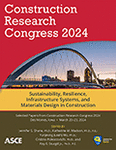Investigating Trends and Influential Factors for Sustainability Ratings in Envision-Certified Infrastructure Projects
Publication: Construction Research Congress 2024
ABSTRACT
Envision rating system is a globally used infrastructure sustainability rating system that assesses all types of infrastructure projects and fosters the necessary improvements to achieve sustainable performance. The Envision framework consists of 64 credits, and based on the achieved points under these credits, infrastructure projects are awarded one of four levels: verified, silver, gold, and platinum, which in turn indicate how well the project addresses the sustainability indicators. This study explores the Envision-certified projects to date (2013−2023) and reviews the project trends, and project types as well as investigates possible correlations between the Envision award levels and various project factors including the project sector, type of infrastructure, project location/country, and year of the award. The findings of this study provide an overview of current trends in the sustainable infrastructure industry, identify and motivate various project sector to pursue sustainability certification, and provide direction for future research to exacerbate developing sustainable infrastructure.
Get full access to this article
View all available purchase options and get full access to this chapter.
REFERENCES
Alsharef, A., Banerjee, S., Uddin, J., Albert, A., and Jaselskis, E. (2021). “Pandemic on the United States Construction Industry.” Int. J. Environ. Res. Public Health, 18(December 2019), 1559.
Chi, B., Lu, W., Ye, M., Bao, Z., and Zhang, X. (2020). “Construction waste minimization in green building: A comparative analysis of LEED-NC 2009 certified projects in the US and China.” Journal of Cleaner Production, Elsevier Ltd, 256, 120749.
Clevenger, C. M., Ozbek, M. E., and Simpson, S. (2013). Review of Sustainability Rating Systems used for Infrastructure Projects.
Elkington, J. (1998). “Accounting for the Triple Bottom Line.” Measuring Business Excellence, 2(3), 18–22.
Elzomor, M., Ferrer, V., Pradhananga, P., and Rahat, R. (2021). “Assessing the Pedagogical Needs to Couple Front-end Planning Tools with Sustainable Infrastructure Projects.” 2021 ASEE Annual Conference, ASEE, Virtual Meeting.
Georgoulias, A. (2015). The Envision Rating System for Sustainable Infrastructure : Development, Applications, and the Potential for Lebanon. CEDRO.
Hu, M. (2021). “2019 energy benchmarking data for LEED-certified buildings in Washington, D.C.: Simulation and reality.” Journal of Building Engineering, Elsevier Ltd, 42(September 2020), 102475.
Huang, C. (2014). “Sustainable pedestrian bridge design: A discussion of the envision rating system.” ICSI 2014: Creating Infrastructure for a Sustainable World - Proceedings of the 2014 International Conference on Sustainable Infrastructure, 722–734.
ISI. (2018). Envision: Sustainable Infrastructure Framework Guidance Manual. Institute for Sustainable Infrastructure, Washington DC, USA.
ISI. (2021a). The Blueprint for Sustainable Infrastructure.
ISI. (2021b). ENVISION: The solution for sustainable infrastructure.
Ismaeel, W. S. E. (2019). “Appraising a decade of LEED in the MENA region.” Journal of Cleaner Production, Elsevier Ltd, 213, 733–744.
Pushkar, S. (2020a). “LEED-CI V3 and V4 silver and gold projects in China and the U.S.” Applied Sciences (Switzerland), 10(13), 1–18.
Pushkar, S. (2020b). “Evaluating State-of-the-Art LEED-NCv4 in the U.S. Svetlana.” Applied Sciences (Switzerland), (3), 124–134.
Pushkar, S. (2020c). “Leed-eb gold projects for office spaces in large buildings transitioning from version 3 (V3) to 4 (v4): Similarities and differences between finland and spain.” Applied Sciences (Switzerland), 10(23), 1–19.
Pushkar, S. (2020d). “Evaluating LEED commercial interior (LEED-CI) projects under the LEED transition from v3 to v4: the differences between China and the US.” Heliyon, Elsevier Ltd, 6(8), e04701.
Rahat, R., Ferrer, V., Pradhananga, P., and ElZomor, M. (2022). “Developing an effective front-end planning framework for sustainable infrastructure projects.” International Journal of Construction Management, Taylor & Francis, 0(0), 1–18.
Reiner, M. B., Fisher, S., and Sperling, J. (2014). “Evaluation of sustainable infrastructure: Development context matters.” ICSI 2014: Creating Infrastructure for a Sustainable World - Proceedings of the 2014 International Conference on Sustainable Infrastructure, 420–433.
Weerasinghe, G., Soundararajan, K., and Ruwanpura, J. (2007). “LEED – PDRI Framework for Pre-Project Planning.” Journal of Green Building, 2(3), 123–143.
Yi, T. Y., and Yun, S. H. (2022). “Saudi Arabia’s LEED Projects: Recent Green Building Trends and Perspective.” IOP Conference Series: Earth and Environmental Science, 1026(1).
Information & Authors
Information
Published In
History
Published online: Mar 18, 2024
Authors
Metrics & Citations
Metrics
Citations
Download citation
If you have the appropriate software installed, you can download article citation data to the citation manager of your choice. Simply select your manager software from the list below and click Download.
